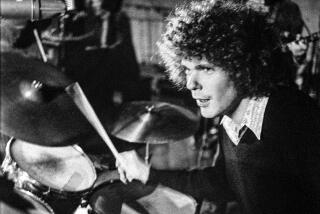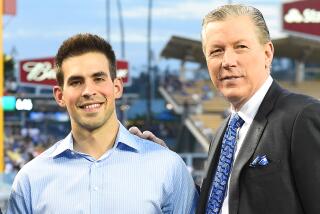The Risky Bet Pays Off for BET’s Interview : O.J. Simpson Still Has Charisma, but Gordon Looks Like the Star
- Share via
The multitudes had their doubts about the O.J. Simpson interview.
Yet he was forthright. He was incisive. He was earnest. He was commanding. He was believable. He was intelligent. He was perceptive. He was unwavering. He was undaunted. He was, in short, close to being exemplary.
And Simpson was pretty impressive, too.
Wednesday night’s quizzing of Simpson live on the Black Entertainment Television showcased not only the quizee and his unreleased video--affirming that months of cell time did not diffuse his personal magnetism before a close-up camera--but also interviewer Ed Gordon.
The insulting advance talk (largely by whites) concerned the likelihood of BET anchor Gordon, an African American, being soft on Simpson, given the ethnicity of his network and polls showing a preponderance of blacks endorsing the verdict that acquitted Simpson of the murders of his ex-wife, Nicole, and Ronald Goldman.
Yet Gordon’s good work Wednesday, while on a sizzling seat with Simpson, should have been anticipated. Those familiar with his interviews of other difficult and controversial subjects (his stand-up work with Nation of Islam Minister Louis Farrakhan in 1994, for example) know he is highly capable. Gordon’s crisp questioning in volatile situations and his professional demeanor--note that he consistently addressed Simpson as “Mr. Simpson” instead of the chummier “O.J.” favored by most of his fellow TV journalists--are a primer for other interviewers.
This guy is definitely no patsy. He prepares, listens carefully, processes information speedily and is strong, often pressing subjects to answer questions they prefer finessing, without being a bully.
What Gordon didn’t ask Wednesday, but should have, given his subject’s stated irritation about others “speaking for me,” was why Simpson did not speak for himself at his trial. The moment cried out for Gordon to jump in.
Queried about that Thursday morning by KABC-AM radio host Michael Jackson, Gordon said he omitted the question in expectation of Simpson repeating the defense line about prosecutors not proving their case against him and it being his legal right not to testify. Still, Gordon should have put the question to Simpson just to get him on the record.
Simpson vs. Gordon came after Simpson’s earlier 11th-hour withdrawal from a scheduled interview with NBC’s Tom Brokaw and Katie Couric and after reports by CNN that he had subsequently promised a TV interview to Greta Van Susteren, the attorney who co-hosts CNN’s legal series “Burden of Proof.” Although praising Van Susteren, Simpson denied Wednesday night that he had made a firm commitment to her.
In any case, as an African American himself, Gordon was able to comfortably ask Simpson questions about Simpson’s alleged rejection of blacks in his personal life and business dealings, questions that such white interviewers as Brokaw, Couric and Van Susteren likely would have been reluctant to ask for fear of a backlash.
Just as most interview programs load up on guests with something to sell, this interview, too, was surely Simpson’s means of marketing both his video and himself. At one point, after hearing Simpson repeatedly refuse discussing details of the murder case--mentioning the civil lawsuit against him and also referring viewers to his $29.95 video, scheduled for release next month--Gordon responded: “Give America something for free, Mr. Simpson!”
It didn’t work; Simpson could not be provoked. Yet it was a noble effort by Gordon that echoed the frustrations of many Americans who believe that Simpson should have testified under oath at his trial, if he was going to speak out at all, instead of saving his account for a profit-making video created by an infomercial producer. Simpson told Gordon he needed the money to support his two young children.
BET surrounded the hourlong Simpson interview in Los Angeles with a pre-show and a follow-up call-in program, intersected by its usual commercials that on this occasion included paid spots for Simpson’s video, featuring an interview with former Los Angeles news anchor Ross Becker.
In an interview on ABC’s “Good Morning America” Thursday, Gordon indicated that he had opposed running the video spots in conjunction with the interview, fearful of giving an impression that BET was “in bed” with Simpson. Responding to perceived public opinion, other commercial networks and stations have rejected the spots, a display of sheer hypocrisy that would have you thinking that they believe in the integrity of the other commercials and infomercials that they routinely run.
Simpson had in his cross-hairs Wednesday the same media that prior to 1994 had adored and doted on him, calling them “the main reason why America is feelin’ the way it’s feelin’ ” about him today. He deplored--correctly--attorneys who “go on TV for an hour and just pontificate” about his case while engaging largely in speculation.
Those media tremors are furiously reoccurring in response to his BET appearance. They affirm that much of the news can still be O.J.-driven and that even though an interview produces no revelations, its mere existence earns a banner headline on TV, where process is elevated over content.
Thus it was not surprising that Los Angeles stations led with giant O.J. packages Wednesday night, most of them shoving deep into their newscasts the day’s much more significant story about a merger of Wells Fargo & Co. and First Interstate Bancorp that is expected to cost California thousands of jobs and have dire consequences for downtown Los Angeles.
That epic story earned 30 seconds on the 11 p.m. newscasts at KNBC-TV Channel 4 and KCBS-TV Channel 2, for example, the latter station declaring that the Simpson interview was “the talk of the town”--even though BET reaches only a minority of Angelenos--and putting on the air a psychiatrist to interpret Simpson’s performance.
You needed no shrink’s help to conclude that, from an emotional perspective, Simpson was plenty effective, that he was movingly persuasive at playing the wounded victim and resurrecting the sincere, likable guy who used to be. You felt a twinge when he turned from Gordon, faced the camera and pleaded for each of us watching to “treat me the way I treated all of you.”
The man is good--very, very good--but not good enough to ever regain his loftiness as a highly paid spokesperson for a corporate America too image-conscious to take a chance on someone whom much of the nation still believes is a murderer.
Of the two men on BET this hour, only one had a bright future in television. And he wasn’t O.J. Simpson.
More to Read
The complete guide to home viewing
Get Screen Gab for everything about the TV shows and streaming movies everyone’s talking about.
You may occasionally receive promotional content from the Los Angeles Times.






